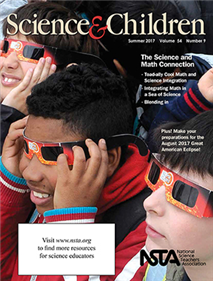All New Science Teachers resources
NSTA Press Book
Toward High School Biology: Understanding Growth in Living Things, Teacher Edition
Would you like to challenge your middle school students to explain a range of phenomena—from how nylon thread can form from two clear, colorless liquids to how a snake that eats only eggs can make body structures such as skin and scales that don’...
By AAAS/Project 2061
NSTA Press Book
Toward High School Biology: Understanding Growth in Living Things, Student Edition
Through 19 carefully sequenced lessons and activities, this unit gets middle schoolers ready for next-level learning. Students explore what happens at the molecular level so they can understand how living things grow and repair their body structures....
By AAAS/Project 2061
NSTA Press Book
Transportation in the Future, Grade 3: STEM Road Map for Elementary School
What if you could challenge your third graders to design the train of the future? With this volume in the STEM Road Map Curriculum Series, you can! Transportation in the Future outlines a journey that will steer your students toward authentic pro...
NSTA Press Book
Creating a STEM Culture for Teaching and Learning
This is the book that will flip the way you think about STEM from “not me” to “I’m in!” Author Jeff Weld is the director of the acclaimed Iowa Governor’s STEM Advisory Council. He sees STEM as “a white-hot, transformative revolution in ...
By Jeff Weld
Blog Post
Using Claim, Evidence, and Reasoning (CER) Strategy to Improve Student Learning
This past school year, I used claim, evidence, reasoning (CER) statements to show three-dimensional learning in my classroom. Several tools are available for doing this, but the one my students like is the CER Graphic Organizer and Transition Words L...
By Cindy Workosky
Journal Article
Methods and Strategies: Ask the Right Question
This column provides ideas and techniques to enhance your science teaching. This month’s issue shows how teachers can use literature and higher-level thinking questions to enhance science instruction....
Blog Post
My ‘Phenomenal’ Journey in Elementary
I am the type of educator who gets very excited about new strategies, new and innovative technology, and new activities for students. However, I was more nervous about than excited about to choosing phenomena for my science units. I felt tremendous p...
By Cindy Workosky
NSTA Press Book
Picture-Perfect STEM Lessons, 3-5: Using Children’s Books to Inspire STEM Learning
"Teachers in our district have been fans of Picture-Perfect Science for years, and it’s made a huge impact on how they fit science into their school day. We are so excited to do more of the same with these Picture-Perfect STEM books!"—Chris Gible...
By Emily Morgan, Karen Ansberry
Blog Post
Using the Crosscutting Concepts to Scaffold Student Thinking
At the recent NSTA National Conference in Los Angeles, three-dimensional learning was, of course, a major topic of discussion. When those discussions focus on classroom instruction, though, the crosscutting concepts are often the forgotten dimension....
By Cindy Workosky
Blog Post
At the core of a Next Generation Science Standards (NGSS) classroom is the sequence of exposing students to an interesting natural phenomenon, having students generate questions about the phenomenon, investigating student questions, then creating a s...
By Cindy Workosky
Blog Post
Introducing Crosscutting Concepts in the Elementary Grades
Four years ago, I moved from teaching middle school science to teaching grades 2–5 STEAM (science, technology, engineering, art, and mathematics) labs. One of the biggest challenges I faced was limited lab time in our elementary school. Because we ...
By Cindy Workosky
Blog Post
Planning Three-Dimensional Instruction
Knowing that content material is most engaging when students can relate to it, I always begin my year with a student survey. The questions are designed to help me design lessons to be as student-focused as possible. Knowing my students’ interests a...
By Cindy Workosky



